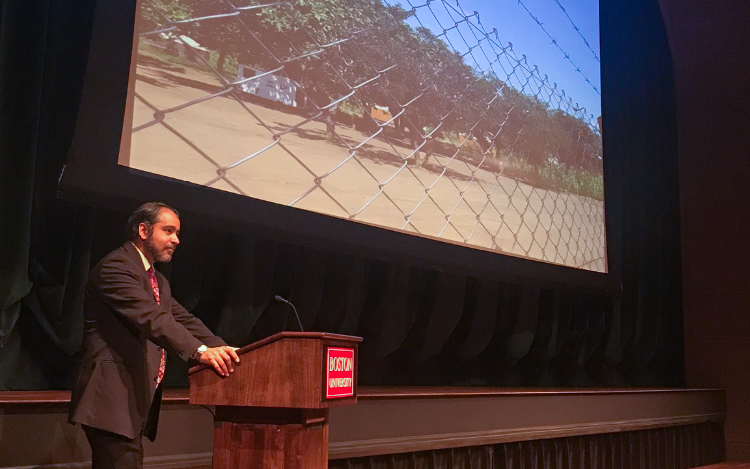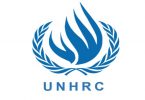By Anna Stjernquist
BU News Service
“On average it takes two seconds to lose their home. It took me more time to read that sentence,” Professor Muhammad Zaman said, as he pointed to the tragedies faced by millions of refugees who are forced out of their homes in response to war, persecution and tragedy.
Swiftly transitioning to a solution-based lens, Zaman, a professor of biomedical engineering at Boston University, said Wednesday night that, if addressed appropriately, a growing influx and efflux of refugees worldwide could help build stronger communities and boost the economy with fresh talent.
In Wednesday’s lecture, “The Global Refugee Crisis,” held at the Tsai Building at Boston University, Zaman laid out his and his lab’s latest research, proposing innovative solutions to the complex migration patterns happening worldwide.
Zaman touched upon four interconnected areas, including the refugee crisis and how to involve the sciences in finding solutions, his most recent research and putting global challenges on university agendas worldwide.
He began by spelling out the size of the problem. He emphasized that a majority of refugees remain in developing countries that are already ill-equipped to tackle local development. Lebanon, for example, now hosts 919,578 refugees, which accounts for roughly 25% of the country’s population.
This is a staggering number when compared to most developed countries. The United States announced limits to their allowance in October, with a goal of less than 18,000 refugees by the end of 2020, according to the Associated Press.
“70.8 million refugees are currently displaced out of their homes, forced by conflict or other strikes. That is 2.5 million people more when compared to the amount of refugees this time last year,” Zaman said.
Given this alarming rise in refugee streams, Zaman said significantly engaging STEM fields is crucial for cost-efficient solutions, stating that “we need to come up with technology that improves access to high-quality medicine at all points, for all people.”
Zaman’s research solidifies his commitment to this goal. In collaboration with a range of institutions, including BU’s Center for Global Health and Development, his lab has developed cheap computational tools and methods for use in developing countries, along with efforts to help set up biomedical engineering departments at universities in Kenya, Zambia, Uganda, Ghana and Ethiopia.
With systems that set out to improve the access to health care in refugee camps, he said the labs current efforts aim at three things: affordable and quantitative testing, a simplified user experience and quantitative results.
Further, he spotlighted the importance of sustainable and local efforts.
“Oftentimes, if refugees get something from the United Nations that is of better quality than what the local community has access to, it creates resentment. We don’t want to create more challenges than there already are.”
By focusing on long-term development solutions, professor Zaman said they are tackling the issues from a development lens, not a humanitarian lens, to avoid temporary aid work.
“One of the things that are important to us is to be able to train the local workforce, which is why over the last five years, we have worked with local medical systems and legislators.”
He highlighted that there are real opportunities for those who embrace the challenges.
“There is so much intellectual capital here, and we should make use of it. Especially in Boston, which remains one of the top places for intellectual leadership and new ideas.”
Universities need to respond to the strong desire of equity that students feel, he said, especially on global campuses such as Boston University.
“It’s a cycle, the more people get involved, the more funding and the more people get involved. Now, the first plunge has to be taken.”





